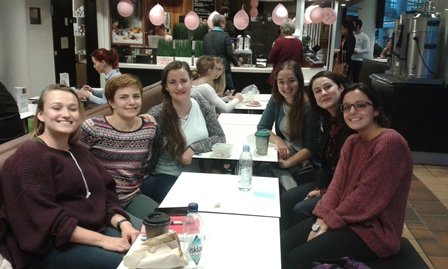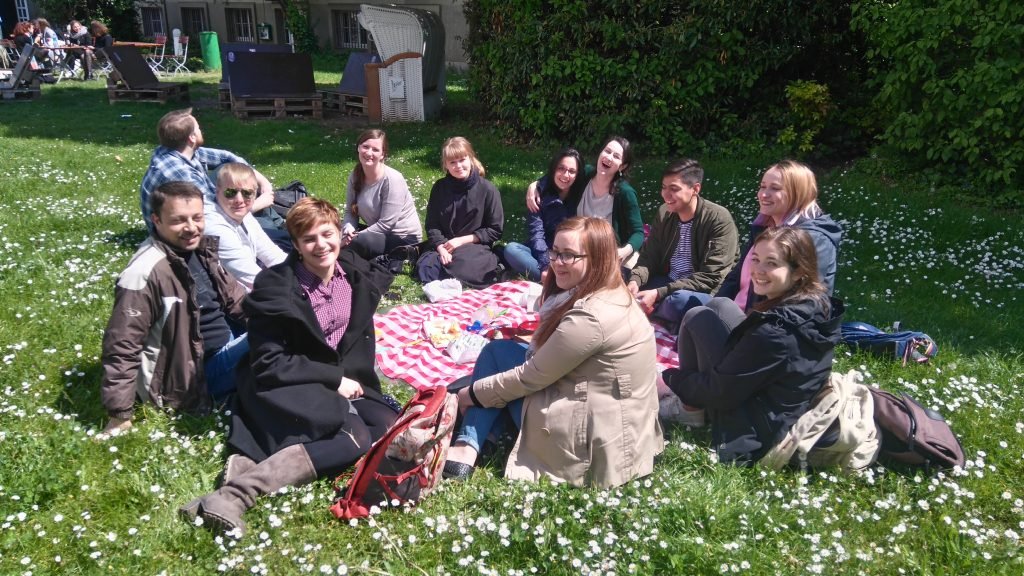Sociolinguistics and Multilingualism (Joint degree programme)
Sociolinguistics and Multilingualism (SoMu) is an international joint-degree study programme offered by Vytautas Magnus University (VMU), Kaunas, Lithuania, Johannes-Gutenberg University (JGU), Mainz, Germany, Stockholm University (SU), Stockholm, Sweden, and the University of Tartu (UT), Tartu, Estonia. SoMu trains a new generation of sociolinguists who will possess a broad scholarly and practical understanding of the parallel use of multiple languages in Europe and a professional awareness of multilingualism’s social dynamics and its cultural, political and socioeconomic impact in varying European contexts.
During their four-semester studies, students’ study in three different universities:
- The first semester is taught in Kaunas at Vytautas Magnus University.
- The second in Mainz at Johannes-Gutenberg University.
- For the third semester students choose between Stockholm and Tartu.
- And the fourth semester students stay at the university of the main supervisor of their MA thesis.
The programme is meant for students, who are interested in the role of language in society. With its geographical focus on the entire Baltic-Sea region, the programme is unique amongst all sociolinguistic MA programmes in Europe in the width of languages and societies covered in it. The language of instruction is English.
What makes SoMu special?
- Multilingualism
- Interdisciplinary Competences
- Unique Geographical Focus
- Cross-cultural Communication
- Built-in Mobility
Student Testimonials
Studying in Kaunas is great because it is a different city and a different university. As it is a first step in SoMu, you begin to understand what the programme is really about, and this is when you know you made the right choice joining it.
Vitalijus, Lithuania. Graduate
Kaunas has a cozy atmosphere and all the necessary facilities for a productive academic and social student life. In addition, VMU faculty members are always extremely helpful – they are as genuinely interested in our academic success as we are.
Zarina, Kazachstan. Graduate
Feedback of lecturer
This international programme can be best described in one word ‘variation’. In SoMu you can both investigate and experience linguistic and cross-cultural variation by studying in a highly diverse international group of students, by learning several new languages, by exploring language use in society, and by moving from university to university in different countries. Worth taking the opportunity!
Prof. Jūratė Ruzaitė, former coordinator of SoMu at VMU
Competencies acquired
You will obtain the following skills:
- Critical and self-critical thinking.
- Cooperation, interpersonal, as well as cross-cultural communication skills.
- General and specific sociolinguistic knowledge, especially regarding multilingualism.
- Knowledge of the general (socio-)historical context and the ability to locate sociolinguistic research and debate in general and European and Baltic-Sea region research.
- Awareness of present societal, cultural and linguistic settings.
- Professional working competence in English.
- Knowledge of lesser-used and taught languages.
- Interdisciplinary methodological skills.
Teaching Staff
Find more about SoMu teaching staff in here
Career opportunities
Sociolinguistics and Multilingualism offers students a possibility for professional networking and perspectives for their future job mobility within the European labor market. Its successful completion opens an access to further academic studies in thematically related third cycle (doctoral) programs with a subsequent career within the academia and/or a wide array of employment possibilities in the private and the public sectors.
The market and job trends signal the demand for versatile specialists in multilingualism issues, and the graduates of this program can expect to find employment in the following fields:
- Academic sphere, e.g., research tasks and/or doctoral studies in sociolinguistics, cross-cultural communication, identity, multilingualism, regionalism, etc.
- Counseling on multilingualism issues at political and cultural institutions, including the EU institutions.
- Counseling and analytical teaching on multilingualism issues in educational institutions of all levels.
- Counseling business and finance organizations in issues involving multilingualism and regional and economic cooperation.
- Various international, national and regional public and private sector institutions and projects concerned with multilingualism, language planning and policy.
- Mass media (with additional qualifications), e.g., in fields such as political journalism.
 |
 |
Contacts of Humanities Faculty (inquiries regarding study programme)
Contact persons of the programme |
Assoc. Prof. Jurgita Vaičenonienė, jurgita.vaicenoniene@vdu.lt |
Address |
Putvinskio str. 23, LT-44243 Kaunas, Lithuania |
Contacts of International Cooperation Department
|
|
studies@vdu.lt |
Visiting Address |
V. Putvinskio g. 23, room 211-215, LT-44249 Kaunas, Lithuania |
Chat with students









